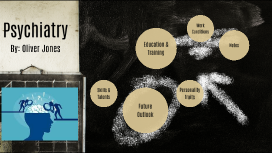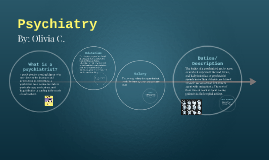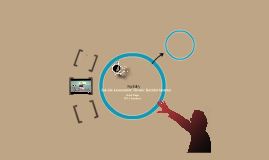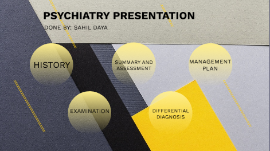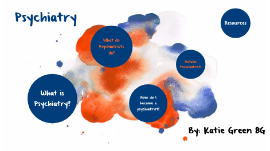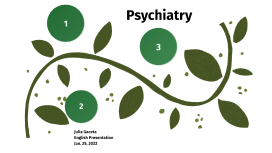Psychiatry Presentation
Transcript: Psychiatry By: Oliver Jones Skills, Talents, & Experience Skills & Talents Gaining experience in psychiatry is very important. Not only do they need to have a good education, but take everything to their advantage. Anything and everything that is offered that could help them get a better understanding or just more experience in psychiatry is important. When going to medical school, they offer an American Psychiatric Association (APA) membership.They can also get a membership to the Psychiatry Student Interest Group Network (PsychSIGN). Exploring psychiatric electives and sub-internships is another great way to get more knowledge and experience. Volunteering in the field or going to watch psychiatrists do their work and working as an intern is a great way to understand how to do the job better. Communication Communication & Perception Psychiatrists need to be able to talk and understand the patient, both verbal and non-verbal ways. Without communication, the psychiatrist will not be able to properly take care of the patient. Psychiatrists need to be able to use perception when it comes to diagnosing patients. They need to be able to pick up on cues and have a good understanding of the situation. Logical Reasoning & Knowledge in Medicine Logical Reasoning They will need inductive and deductive reasoning for this job. They need to be able to analyze and observe the patient, as well as, hypothesize about what is going on Psychiatrists really focus on the more medical and scientific part of mental illnesses. It is important for them to have knowledge in medicine, so they can do their job. Problem Solving & Stress Managment Problem Solving Psychiatrists need to help the patient with their problems, they also need to determine the best solutions for the patient; whether that be medicine, therapy, etc. Psychiatrists need to be able to handle stress. Not only to help their patients, but if something unexpected happens during a session, they need to be able to handle the situation well. Personality Traits Personality Traits Compassionate, empathetic, understand Persistent Cooperative Organized Punctual Being Suited for Psychiatry Being Suited for Psychiatry Psychiatrists need to be understanding with their patients and be able to properly help them. They need to take the issues the patients are dealing with seriously and empathize with the patient. Psychiatrists need to be cooperative and persistant with each other, the patients, and the patient’s relatives. It’s important for the psychiatrist to find the best plan and treatment for the patient. They also need to be persistant with their patient's a getting them to open up about their problems. Psychiatrists need to be very organized and punctual. From keeping track of records and files to remembering what patients tell you during appointments; they need to keep a clear and concise record of a lot of things. Education & Training Education & Training Psychiatrists will spend about 4 years in college, getting a bachelor’s degree. Once they have obtained that, they will go to medical school for 4 years, and then complete 2,000 hours (or about 4 years) of residency. Residency is when they will have formal practice as a physician, while being supervised by a licensed psychiatrist or another medical doctor. Once they have finished everything, they will have a bachelor's degree, a medical degree, and a license to practice. In Depth Education In Depth Education Psychiatrists will take 4 years of college to begin with, earning their bachelor's degree. They then, will need to take the normal things required in medical school, like anatomy, biochemistry, and psychology; as well as, courses in psychiatry, behavioral science, and neuroscience for the first 2 years. For the following 2 years, they would need to work with 6 different medical physicians, including psychiatrists. After graduating medical school, they will need to take 4 years of residency. For the first year, they will spend their time taking care of patients that have a wide range of medical illnesses. For the next 3 years, they will be spending their time in psychiatry residency. In psychiatry residency, they will learn how to diagnose and treat mental illnesses. A lot of psychiatrists tend to do even more years of residency. Starting Jobs Starting Jobs One good starting job is a research assistant. They have the important skills of research planning, data analysis, implementation, and report writing. Having any job in human resources is also a good starting job. They judge employees and find the right fit for them and try to keep them there. They also make sure that the policies are good for the work environment. Jobs Duties & Responsibilities Work Conditions Counsel and care for the patients. Provide them with the proper care. Gather and keep patient information; things like records, files, and medical history. Evaluating, diagnosing, and prescribing/ administering the proper care for the patient and their needs.






